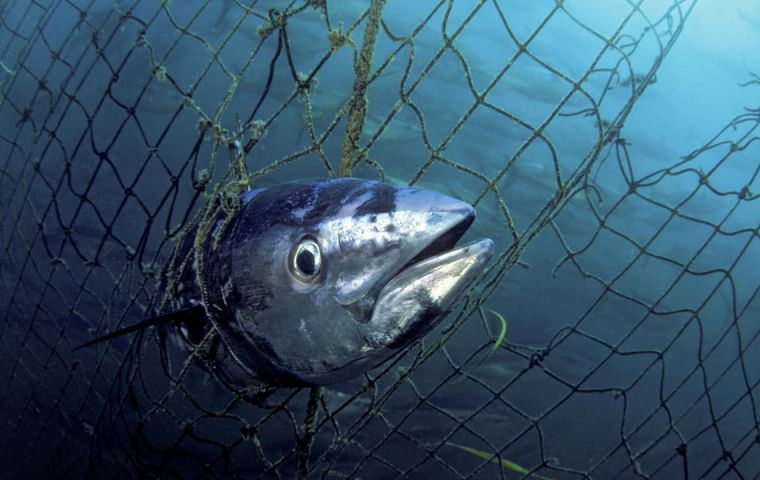MercoPress. South Atlantic News Agency
Bluefin tuna back in UK waters: long term ocean current warming
 Bluefin tuna are one of the largest and fastest fish on the planet - they can weigh up to 900kg and can travel at speeds of up to 70 kilometers per hour.
Bluefin tuna are one of the largest and fastest fish on the planet - they can weigh up to 900kg and can travel at speeds of up to 70 kilometers per hour. Growing numbers of bluefin tuna are being seen in the waters around the UK because of the warming impact of a long-term ocean current say researchers. These large, speedy fish are a globally endangered species and almost disappeared from the UK around 40 years ago.
Scientists say that their recent rise is connected to the Atlantic Multidecadal Oscillation (AMO). Now in a warm phase, the current makes UK waters more hospitable for the species.
Bluefin tuna are one of the largest and fastest fish on the planet - they can weigh up to 900kg and can travel at speeds of up to 70 kilometers per hour.
In the 1930s, the species was a common sight in the seas off Scarborough and was highly prized by big-game fishers. However, from the 1940s, the species began to decline and by the early 1990s had all but disappeared.
But over the past five years or so, sightings of the warm blooded fish have increased off the UK once again with many of these encounters captured on social media.
This situation has been mirrored in the Nordic seas, in the waters between Greenland and Norway which witnessed a spectacular collapse in tuna numbers in the 1960s, when the fish declined dramatically in just two years.
Researchers now believe that the warming and cooling impact of the long term current, the Atlantic Multidecadal Oscillation is key to the ebb and flow of the species.
The scientists' new paper has been published in the journal Science Advances. The team looked at the changing abundance and distribution of bluefin tuna in the Atlantic over the past 200 years.
They've concluded that the major factor influencing the movement of bluefin is the AMO.
“The ecological effects of the AMO have long been overlooked and our results represent a breakthrough in understanding the history of bluefin tuna in the North Atlantic,” said lead author Dr Robin Falllettaz from the University of Lille.
He believes that while current numbers of sightings of the UK may indicate that the species is doing well, this may not be the case everywhere.
”When water temperature increases during a positive AMO, bluefin tuna move further north. However, the most positive (warming) phases of the AMO also have a detrimental effect upon recruitment in the Mediterranean, which is currently the most important spawning ground, and that will affect adult abundance a few years later.“
”If the AMO stays in a highly positive phase for several years, we may encounter more bluefin tuna in our waters but the overall population could actually be decreasing.”
AMO is a measure of a naturally occurring climate cycle in the North Atlantic that see sea surface temperatures rise and fall over long time periods.
Approximately every 60 to 120 years the AMO switches between positive and negative phases. During positive (warm) phases, Ireland and the UK experience warmer weather but it also brings more hurricanes and drives drought in the US Midwest. A cooler AMO can lead to drought in many parts of Africa.
Right now the fishing of bluefin tuna in British waters is prohibited. But the recent rise in bluefin numbers has encouraged campaigners to petition the government to allow amateur fishers to catch the endangered species.
The Angling Trust want to establish a “catch and release” licensed fishery which would they believe would have enormous economic benefits for areas such as Cornwall.
But the scientists involved with the latest study are cautious about this approach.
“Bluefin tuna have been extensively overfished during the 20th century and the stock was close to its lowest in 1990, a fact that further indicates the recent changes in distribution are most likely environmentally driven rather than due to fisheries management and stock recovery,” said co-author Dr Richard Kirby from the Secchi Disk Foundation.
“Before we further exploit bluefin tuna either commercially or recreationally for sport fishing, we should consider whether it would be better to protect them by making the UK's seas a safe space for one of the ocean's most endangered top fish.” (BBC)




Top Comments
Disclaimer & comment rulesCommenting for this story is now closed.
If you have a Facebook account, become a fan and comment on our Facebook Page!